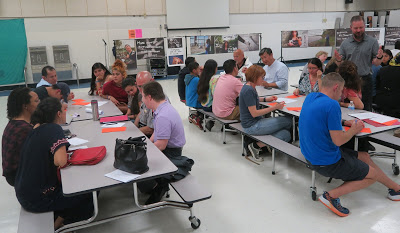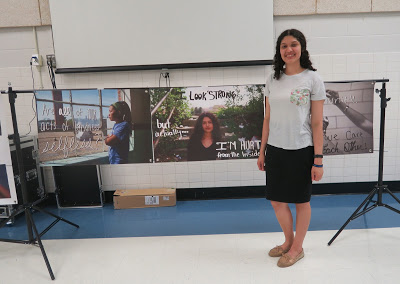Youths, adults share insights on community
 |
| Some of the students in the Re-Imagining Community Initiative read their poems. |
“Don’t criticize what you don’t understand.”
“Children are born with no knowledge of hate.”
“Where there’s a sense of struggle, there’s a sense of hope.”
“Wherever you are, give others a smile.”
“Just because we are different, does not mean we are not human.”
Those are some random lines from poems by local teens who have been participating in the Youth Re-Imagining Community Initiative.
 |
| Groups of youths and adults discuss the meaning of community among older and younger generations. |
The youths — a diverse group students from local high schools, including Stuart, Falls Church, Annandale, and Woodson — read their poems at a community dialogue session at Bailey’s Elementary School May 9.
The Youth Re-Imagining Community Initiative was developed by the Fairfax County Department of Neighborhood and Community Services with support from the Fairfax County Police Department and George Mason University.
The students attended several workshops at GMU, and Joshua Sackett of the GMU School of Art helped them create artworks consisting of text overlaid on large photographs. Those pieces were displayed at the three community dialogue sessions held over the past year.
The teens also participated in a session at the GMU School for Conflict Resolution and Analysis’ retreat center, learned how to turn their feelings into poems, and wrote their poems on paper they created themselves.
 |
| Elsy Dominguez, a senior at Stuart High School, stands next to the artwork she created as part of the Youth Re-Imagining Community Initiative. |
The theme of those projects was about their vision of community and what kind of community they want to inherit.
At the May 9 community dialogue session, the teens read their poems aloud, in Spanish and Vietnamese, as well as English.
The poems served as a springboard for small group discussions among the teens, parents, and community members, who were asked to talk about the roles and responsibilities of younger and older generations in community engagement.
Here are some of the thoughts (paraphrased) that arose from those discussions:
Adults and youths have responsibility for building community together.
The most important things for adults are to support our children, provide an education, and above all, give them love.
The older generation is responsible for educating youths and passing on the culture.
When the older generation was young, people were most concerned about their own lives and immediate neighborhoods, while youths today are more aware of global issues and more interested in helping people in other countries.
Young people are going through things that older people don’t understand, due in part to the influence of technology and social media.
The older generation must model the way and have compassion to teach; the younger generation must lead the way and have compassion to learn.

